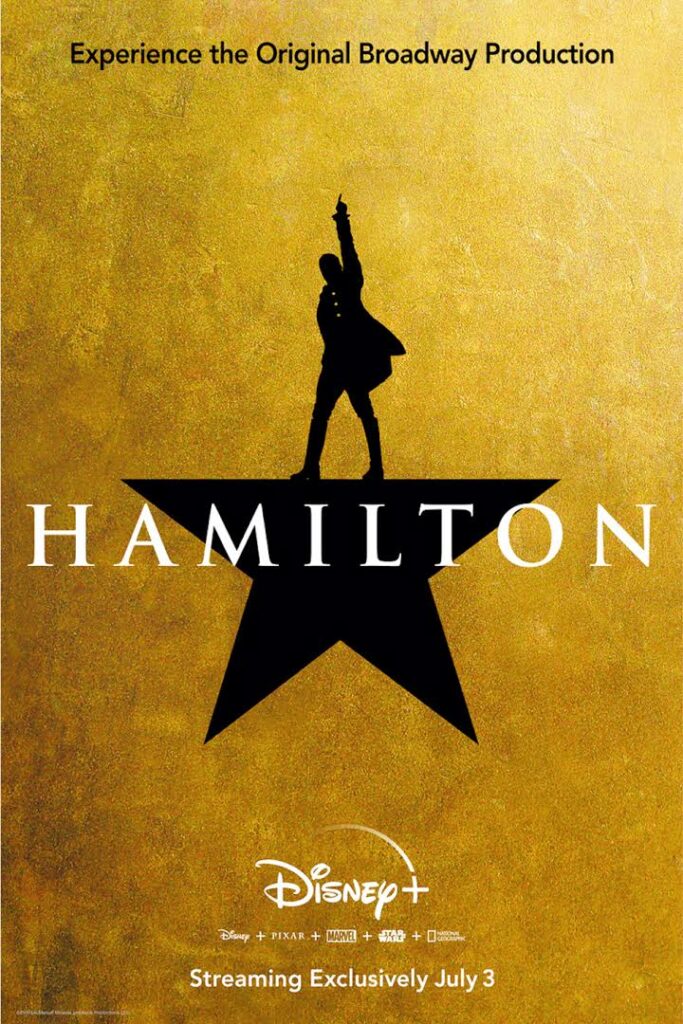Hamilton
Hamilton is a 2020 Disney film that is actually a recording of the 2015 Broadway musical by Lin-Manuel Miranda of the same name. Based on the Founding Father, Alexander Hamilton, the show went viral immediately. Social media went into a frenzy. Everyone was talking about it, not just the musical niche of the internet. Even though there is no conventional film adaptation, it is still popular among non-theatre fans who enjoyed it like a proper movie when Disney released it as one during the very first lockdown. One of the reasons for this much-deserved spotlight was the hype back in 2015. Through word of mouth, endorsed by celebrities, everyone wanted to know more about it. Those who thought it was overrated immediately changed their misconception on viewing it. Not only that, the musical had a diverse cast which was revolutionary. Casting PoC (people of colour) actors in roles based on real white men made us realize that roles do not have to be defined by one’s colour. But is that it? If you look up the synopsis, it would seem plain. Who was Hamilton? The Americans knew him as a racist Founding Father, while for us Indians, he was just the first US Secretary. So, why didn’t more fantastical Broadway plays like Wicked or Phantom of the Opera with a more eye-catching story reach that level of fame? The execution of the play may have a lot to do with that.
The plot follows the life of Alexander Hamilton who comes from a small Caribbean island with big dreams and meets the other to-be Founding Fathers of America. Interspersed with his personal life, from his marriage to his publicized affair and the death of his son, the 2-act-play also includes his role in his country’s independence and later his contribution in stabilizing a free America’s economy. His on and off friendship with his nemesis Aaron Burr is brought to the forefront as their ideologies keep clashing to the point that their relationship ends with an old-fashioned gun duel where both parties shoot at each other from a distance.
Along with the melodrama, most musicals have intense ballads, songs of an epic scale which are not for everyone. However, Hamilton features a variety of genres from rap, hip-hop to pop which makes the relatability factor vast as it is enjoyed by everyone. The lyrics are witty and easy to sing along. The songs are also cleverly weaved into the plot so we aren’t tired of the musical format of story-telling. Onomatopoeic sounds of warfare become accompaniments to the music, giving a fun twist to otherwise tedious action sequences. Unlike most plays that heavily rely on lighting to differentiate between time, locations and feelings, Hamilton doesn’t overdo it, choosing the path of subtlety in an otherwise enthusiastic musical. The cast takes the old, boring historical figures of the American Revolution and revamps them. Jonathan Groff steals the spotlight every time he’s on stage as King George III, giving him a whimsy, foppish vibe, allowing us to make fun of the only white male in the play. Another actor to keep our eye on is Leslie Odom Jr. who gives us a nuanced and sympathetic version of Aaron Burr. At the end of the film, the infamous Hamilton-Burr duel scene is taken with a delicate approach with Miranda’s Hamilton facing Burr where both supposedly had no intention of killing each other. With the thick air of suspense, the trepid duo walk on eggshells with the music rising and rising till it hits the crescendo and shots are fired. The climax comes downhill very quickly as the remaining character’s cathartic ending makes us doubtful as to who to cheer for. But it wouldn’t be fair to those oppressed if we ignored the real, gritty story behind this scraggy, small-town boy with big dreams.
In real life, Hamilton was a slave-endorsing racist. The musical did acknowledge that by casting 4 of the actors in dual roles as a dig towards Hamilton who assumed all black people looked the same. But since we tend to root for fictional villains like Marvel’s Loki and Game of Thrones’ Cersei, we need to know the true story behind Hamilton instead of blindly appreciating the play’s larger than life semi-fictional anti-hero. While the play is used to promote everything democracy stands for, Hamilton was in reality the opposite. He was an authoritarian who promoted constitutional monarchy minus the democratic aspect. According to his theory, the president should be above the law and in power all their life. A borderline dictator, if Hamilton had succeeded in executing his vision, there would have been no democracy in America. Unfortunately, thanks to his hand in building Wall Street and the financial infrastructure of America, there are hidden traces of authoritarianism that have the potential of toppling democracy.
So, why did Lin-Manuel Miranda pick this particular character? An inspirational figure for the Nazi regime, author Ron Chernow completely erased Hamilton’s militant views, focusing on his financial activities and going to the extent of calling him a modern democrat in his book on which the musical is based. Additionally, since he came from the Caribbean, Hamilton is considered an immigrant who influenced and shaped a newly forming government. This resounded with Miranda who himself is of Hispanic descent. In fact, the West Indies played a major role in the decision of casting PoC and majorly black actors in historical white figures as they too are the backbone of the country. No film is perfect. But here is why this musical has such a huge fan-following despite the person it’s based on. Film is a medium of story-telling, once we accept the shortcomings, we can enjoy the story that Miranda is weaving. We learn to separate the music and the talent that was showcased. We see the opportunity it has provided by opening Hollywood’s eye which has led to more PoC actors being cast in roles despite the character’s race like Dev Patel in Personal History of David Copperfield and the cast of Bridgerton. Race is a social construct and the successful casting of white characters without focusing on their race has shown us that there is no loss of identity that people had had us believe for so many years.
Disclaimer: The above review solely illustrates the views of the writer.




